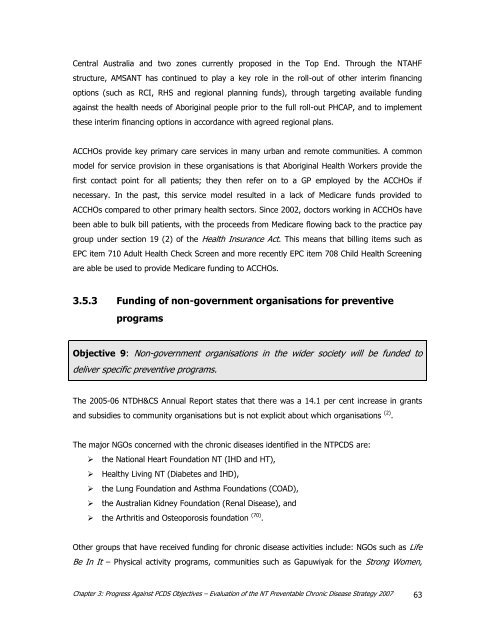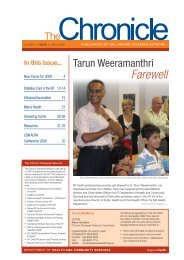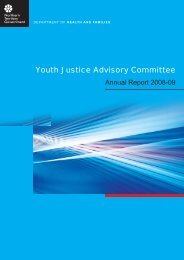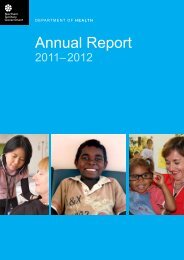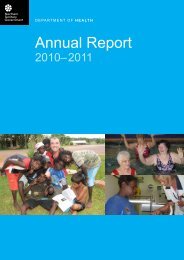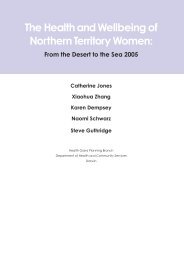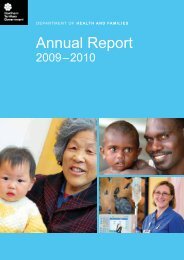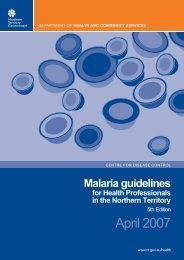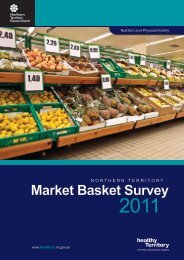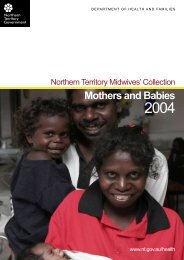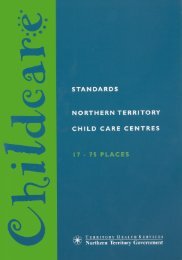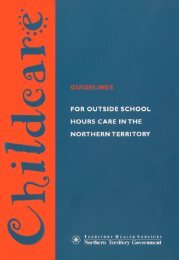PCD Strategy Evaluation 2007.pdf - NT Health Digital Library ...
PCD Strategy Evaluation 2007.pdf - NT Health Digital Library ...
PCD Strategy Evaluation 2007.pdf - NT Health Digital Library ...
Create successful ePaper yourself
Turn your PDF publications into a flip-book with our unique Google optimized e-Paper software.
Central Australia and two zones currently proposed in the Top End. Through the <strong>NT</strong>AHFstructure, AMSA<strong>NT</strong> has continued to play a key role in the roll-out of other interim financingoptions (such as RCI, RHS and regional planning funds), through targeting available fundingagainst the health needs of Aboriginal people prior to the full roll-out PHCAP, and to implementthese interim financing options in accordance with agreed regional plans.ACCHOs provide key primary care services in many urban and remote communities. A commonmodel for service provision in these organisations is that Aboriginal <strong>Health</strong> Workers provide thefirst contact point for all patients; they then refer on to a GP employed by the ACCHOs ifnecessary. In the past, this service model resulted in a lack of Medicare funds provided toACCHOs compared to other primary health sectors. Since 2002, doctors working in ACCHOs havebeen able to bulk bill patients, with the proceeds from Medicare flowing back to the practice paygroup under section 19 (2) of the <strong>Health</strong> Insurance Act. This means that billing items such asEPC item 710 Adult <strong>Health</strong> Check Screen and more recently EPC item 708 Child <strong>Health</strong> Screeningare able be used to provide Medicare funding to ACCHOs.3.5.3 Funding of non-government organisations for preventiveprogramsObjective 9: Non-government organisations in the wider society will be funded todeliver specific preventive programs.The 2005-06 <strong>NT</strong>DH&CS Annual Report states that there was a 14.1 per cent increase in grantsand subsidies to community organisations but is not explicit about which organisations (2) .The major NGOs concerned with the chronic diseases identified in the <strong>NT</strong><strong>PCD</strong>S are:‣ the National Heart Foundation <strong>NT</strong> (IHD and HT),‣ <strong>Health</strong>y Living <strong>NT</strong> (Diabetes and IHD),‣ the Lung Foundation and Asthma Foundations (COAD),‣ the Australian Kidney Foundation (Renal Disease), and‣ the Arthritis and Osteoporosis foundation (70) .Other groups that have received funding for chronic disease activities include: NGOs such as LifeBe In It – Physical activity programs, communities such as Gapuwiyak for the Strong Women,Chapter 3: Progress Against <strong>PCD</strong>S Objectives – <strong>Evaluation</strong> of the <strong>NT</strong> Preventable Chronic Disease <strong>Strategy</strong> 2007 63


